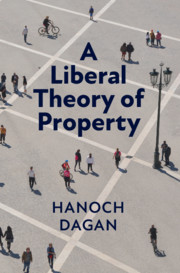Book contents
- A Liberal Theory of Property
- A Liberal Theory of Property
- Copyright page
- Dedication
- Contents
- Preface
- 1 Liberal Property
- 2 Some Basics
- 3 Autonomy and Private Authority
- 4 Property’s Structural Pluralism
- 5 Property’s Relational Justice
- 6 Making Property Law
- 7 Just Markets
- 8 Property Transitions
- 9 Afterword
- Notes
- Index
6 - Making Property Law
Published online by Cambridge University Press: 04 March 2021
- A Liberal Theory of Property
- A Liberal Theory of Property
- Copyright page
- Dedication
- Contents
- Preface
- 1 Liberal Property
- 2 Some Basics
- 3 Autonomy and Private Authority
- 4 Property’s Structural Pluralism
- 5 Property’s Relational Justice
- 6 Making Property Law
- 7 Just Markets
- 8 Property Transitions
- 9 Afterword
- Notes
- Index
Summary
Making property law means more than identifying a legitimate and substantively appealing conception of property. It also requires answering three further (and somewhat related) questions. First, what are the appropriate institution(s) for creating, interpreting, and developing property law (the institutional question)? Second, to what extent can a legal system that embraces the liberal conception of property also comply with the rule of law? Third, what are the limits (if any) of the authority of property law’s architects?
Keywords
- Type
- Chapter
- Information
- A Liberal Theory of Property , pp. 148 - 178Publisher: Cambridge University PressPrint publication year: 2021

